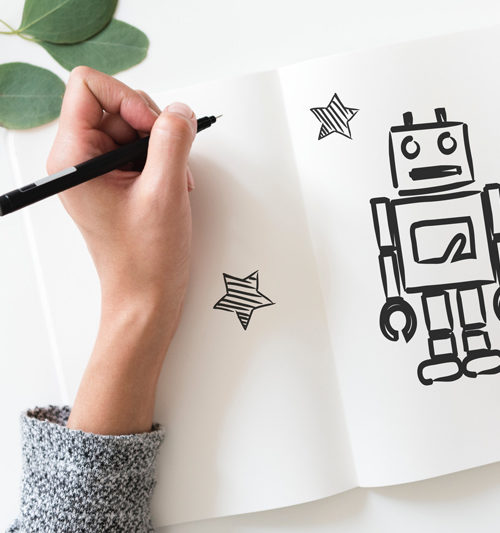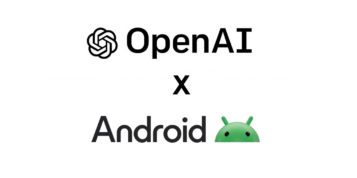‘Hi, there! How can I help you today? P.S. I’m not a bot.’
I saw this message in a chat window earlier this week, and it caught my attention mainly because this AI chatbot wasn’t using Artificial Intelligence. Though tools like this will help to automate communication and will shape our consumption habits, the human element will never be fully replicated. With bots already ubiquitous in our daily lives, the human marketer may soon have to convince us that AI is nothing to fear, while simultaneously working to differentiate themselves from a programme that can do their work 100x faster.
‘Goodbye human’
Successful marketing campaigns need a certain level of instinct or empathy to reach an audience, but an astonishing amount of marketing tasks have already been automated. A lot of digital lead generation focuses on how to get website visitors to exchange their details for an exclusive piece of content like a white paper. Once this information is completed, software like Ninja Forms or Inbox25 can send the white paper automatically, schedule a follow-up call, set reminders, update customer preferences on the CRM, and integrate with any number of other applications to keep that customer happy and find others like them.
So what about relating to that customer enough to interest them in the first place? Surely that needs the human touch? In the same way that AI can learn from publicly available computer code to write new programmes, or learn from audio for voice recognition, it can also learn to write by using the copious amount of content available online.
Aaron Souppouris, Senior Editor at Engadget conducted an experiment using a Recurrent Neural Network (RNN) devised by Andrej Karpathy – now Director of Artificial Intelligence at Tesla. The programme analysed text and used it to create new sentences character by character – it wasn’t perfect, but it improved exponentially when fed more sample text.
Content produced like this would clearly need to be edited by a human at first, but considering the rate at which these programmes learn and improve, it is only a matter of time before they can create text indistinguishable from an average, if slightly boring, content writer. Google, Facebook and the like already use algorithms to decide which articles to show us, so if the content is written by similar algorithms, will everything we read be personalised to our taste, based on a computer’s judgement?
The big picture
Reaching your market is more than just following a formula, and a programme learning about human behaviour through trial and error may get to the right answer but will not have the instinct to cut short this process when necessary. Managing complex marketing processes and making judgement calls on the unknown, such as how to appeal to a particular audience for a completely new product, cannot be automated.
An experienced marketer can provide intuition based on human experience, make a judgement as to what should be done, and then test that idea even in circumstances that have never occurred before (a situation that AI struggles with immensely). An AI programme could test one thousand times and reach the same conclusion but will not have that base instinct that a great marketer will start with, rather than build up to, and will, therefore, struggle to come up with the golden strategy that no-one has thought of before.
The best example of this in modern times is Steve Jobs’ introduction of the iPhone. No amount of analysis and very few Artificial Intelligence programmes could have predicted the success of the iPhone at a time when iPods, mobile phones, and mobile internet devices were being sold separately. Clearly, there is much more to Apple’s success than only creating a three-in-one product, and Jobs was spectacularly good at creating a buzz around a need that he instinctively felt in the minds of the public – an instinct that AI can’t replicate.
Working on it
Improving our human attributes is the key to success, and we must change the way we work to support and nurture these attributes and make the most of AI. In our company, Pod Group, we developed a strategy that promotes Wisdom, Emotional intelligence, Intuition, Responsibility and Development (WEIRD) as the essential qualities which set us above machines. This strategy sets out to create a sense of individual ownership and leadership, helping to drive innovation and personal responsibility from the front line.
With the assumption that everyone is capable, that we should enjoy our time at work, and that value is created by maximising what we can do collectively, lots of interesting things happen. Because we should enjoy working, people can choose where they work, and when to take a holiday. Because all information about the company is transparent and available – including salaries decided by each individual – every project can be completed knowing all of the relevant information, including costs and returns.
In this framework, the human capacity to think on our feet, develop completely original ideas, and foresee consequences in minute detail can flourish, and each of us will get a little closer to our own iPhone breakthrough. In terms of marketing, this is the scythe that will separate the wheat from the chaff, as the ability to manage a successful campaign and relate personally to an audience becomes a precious commodity.
Artificial Intelligence is extremely powerful and will only get closer to our level of understanding as it learns from our experience. Human marketers then must work to become more than the tasks they undertake, to be leaders and visionaries in themselves and to manage the grunt work that AI will take care of. Working with AI will push us into a new age of innovation, but we have to adapt as well to emphasize the skills that make us human – instead of trying to beat AI at its own game.






